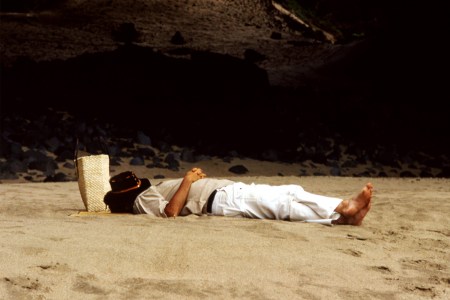“The strange thing is that for the longest time I was applauded for my lifestyle — the exercise I did, the way I looked after my diet,” says Jason Wood. “But where’s the line between looking after your health and an obsession?”
The answer for Wood came while he was out at dinner. The restaurant was unable to accommodate a substitution for one of the ingredients he didn’t want to eat. His response? “I broke down,” he says. “I couldn’t take the anxiety of breaking one of my food rules. It was then I realized that all I ever really thought about was food and exercise. I spent hours exercising or researching the latest health trends, all because I had this idea that if I only exercised more and ate better, I’d be happy.”
Wood — now director of community engagement for the National Association of Anorexia Nervosa and Associated Disorders (ANAD) in Chicago — got therapy for what was described as an “unspecified eating disorder.” It was only a year into his treatment, in 2021, that he found a more helpful label, albeit one that his nutritionist had never heard of: orthorexia nervosa.
My 7 Healthiest Habits as a Wellness Writer
Wellness doesn’t have to be so intense. Here’s what I stick to.What Is Orthorexia?
While the better-known anorexia nervosa is a debilitating preoccupation with the quantity of food eaten, orthorexia concerns the quality of one’s dietary consumption. Sufferers tend to avoid food prepared by anyone other than themselves, sideline other aspects of their life in order to maintain control over their diet and exercise routines, down countless vitamins and supplements, and habitually cut entire food groups from their diet. Ironically, the result is not healthy.
“You may believe that bananas are good because they’re rich in vitamins, but if you only eat bananas that’s a problem,” explains professor Anna Brytek-Matera, head of the nutritional psychology unit of the Eating Behavior Lab at the University of Wroclaw in Poland. “Sufferers believe that their eating habits are healthy, but objectively they’re not. That’s why people with orthorexia nervosa often don’t understand that their behavior is problematic and is the cause of their emotional distress. In fact, it’s something they’re often proud of.”
That’s not the only challenge to treatment. Healthcare professionals are still debating whether orthorexia is its own condition, or a subset of other eating disorders with established diagnoses. Orthorexia nervosa isn’t, for example, featured in the Diagnostic and Statistical Manual, healthcare professionals’ authoritative guide to mental disorders (though it’s possible it will be included in the next edition). Higher-quality, longitudinal studies are required. Brytek-Matera, in fact, is a member of the international Orthorexia Nervosa Task Force established a couple of years ago, and is working to drive this research and establish a universal definition.
Furthermore, while sufferers of anorexia nervosa are distressingly obvious, sufferers of orthorexia are hiding in plain sight. To that end, researchers are looking into whether orthorexia has a long history that’s been overlooked.
Blame Modernity. Maybe.
An individual case may trace its roots to trauma, genetics or some other underlying mental health condition. Orthorexia could also be a more recent and widespread byproduct of modern society. After all, many of the behaviors outlined above are far too familiar to many people. Our culture is obsessed with health information, fitness and food fads; and worryingly, much of that information is misinformed, or abbreviated to the point of incoherence and misunderstood by the audience.
“Many people struggle with [what would be called] disordered eating. They’re always on a diet, for example. But it’s a matter of degree,” stresses Jennifer Rollin, an eating disorder therapist and founder of Maryland’s The Eating Disorder Center. “In particularly challenging orthorexia cases, ‘healthy person’ has become an identity for them, even though it’s led them to be physically or mentally unhealthy. They see themselves as just being ‘into wellness’, which normalizes what they do. [It’s why it’s often] friends or family members who push [sufferers] to seek therapy.”
And for some, that therapy comes only just in time. Ally Pesta, now a Colorado-based eating disorder recovery coach, and author of Beyond My Body: Recovering from a Complex Eating Disorder, collapsed while traveling in Europe with a suspected heart attack and was told by doctors that, had this not hospitalized her, she likely would have had about a week to live. That came as a shock, “not least because I thought I was the healthiest person in the world,” she says.
“I was exercising for five hours a day, going to the gym wearing layers and layers even at the height of summer,” she adds. “If someone with anorexia may only eat one thing a day but that might be a doughnut, to me not eating ‘bad’ foods like that felt like a superpower. I weighed everything I ate. I really responded to the fear that [accompanies] a lot of our food information. That’s the difficulty with recovery — you have to face your demons head-on. It’s not like alcoholism, in which there’s a chance of avoiding bars. Diet culture is just part of the way society is now.”
“Current social and media pressures to attain a perfect body image have to be considered in the context of orthorexia nervosa,” argues Dr. Jose Francisco Lopez-Gil, a researcher in health and nutrition at the University of Murcia in Spain. “Many individuals adhere to rigid dietary plans in pursuit of an ideal body image, which can lead to the development of obsessive healthy eating behaviors to achieve their goals.”
Who’s Most Likely to Suffer From It?
To date, studies have made some interesting, albeit inconclusive findings, such as: orthorexia nervosa appears to be more prevalent in adults rather than adolescents; and it’s more common in the middle-class and affluent — those with the time and money to pay microscopic attention to their health. It also disproportionately affects people who work in medicine and the performing arts, who might be more conscious of their health or appearance.
Perhaps most revealing is a 2023 study suggesting that people with orthorexia traits are also more likely to obsessively follow nutrition influencers on social media. This actually isn’t so new. When orthorexia nervosa was first identified by the physician Steven Bratman in 1997, he described a growing number of “health food junkies.”
Some researchers argue that orthorexia nervosa chimes with the historian Elaine Showalter’s description of eating disorders as “modern hysteria epidemics.” They’re a product of three factors: vulnerable patients, doctors who are enthusiastic about the diagnosis, and a culture that supports it all.
A Lunge for Control
Dr. Louise Morgan, a historian specializing in eating disorders with the University of Warwick, argues that orthorexia nervosa is a consequence of something much more deep-seated, and pre-dating modern media: the idea that people have always had a primordial need to be reassured that the food they eat is safe, and that the industrialization of food production over the last century or so has rendered them unable to make their own checks. The media tends to exacerbate these concerns — as have government campaigns around the world nudging us towards healthier lifestyles — but several decades of high-profile public-health scares and scandals over food haven’t helped either.
“A concern with food quality isn’t new. What’s new is the way social media is connecting people and highlighting interest,” Morgan suggests. “Life in general is so much about control. Controlling what we consume is a way we assert control when can’t control so much about our lives, [and] that’s always been there, I think.”
What Does the Future Hold?
The problem here is also about branding: anorexia nervosa, Morgan notes, has been an identifiable disorder for some 150 years, but it has also benefited from its visibility, not least through several celebrity cases. “[Unfortunately] orthorexia nervosa fits with what we might see as a good way of living. Even when it’s obsessional, it’s considered in a more comedic way,” she says. “And that limits how a response can be acted on. [Consideration of orthorexia] has improved massively over recent years, but I think there’s a long way to go before we take it as seriously as we should.”
Brytek-Matera says it will likely take another three to five years of studies to reach more concrete conclusions about othorexia nervosa. But even without official recognition, it’s a real enough phenomenon to her. “I see it in therapy all the time,” she says. Treatment typically comes in the form of cognitive behavioral therapy, together with eating and exercise plans, putting both on a more moderate footing rather than the extremes of the sufferer’s obsession. Jason Wood, however, would like to see a more proactive stance taken.
“In school we have physical education but we don’t teach children how to navigate the food culture we’re in now, how to take a more neutral approach to it — rather than seeing foods in terms of being ‘good’ or ‘bad’,” he says. “We need to give young people the ability to decipher all of the messaging they’re being exposed to.” Just as importantly, he argues, we should all be able to name this condition. Woods says he would find himself lumped into meetings with those trying to deal with anorexia or bulimia and struggled to relate to their experience.
As for his own experience of orthorexia nervosa, it will, he suspects, always be with him.
“It took me a year into recovery before I felt I could skip a day of exercise. For a long time I felt anxiety before a meal and guilt afterwards,” he says. “And the truth is that the voice of orthorexia nervosa is still with me from time to time.”
Whether you’re looking to get into shape, or just get out of a funk, The Charge has got you covered. Sign up for our new wellness newsletter today.

























